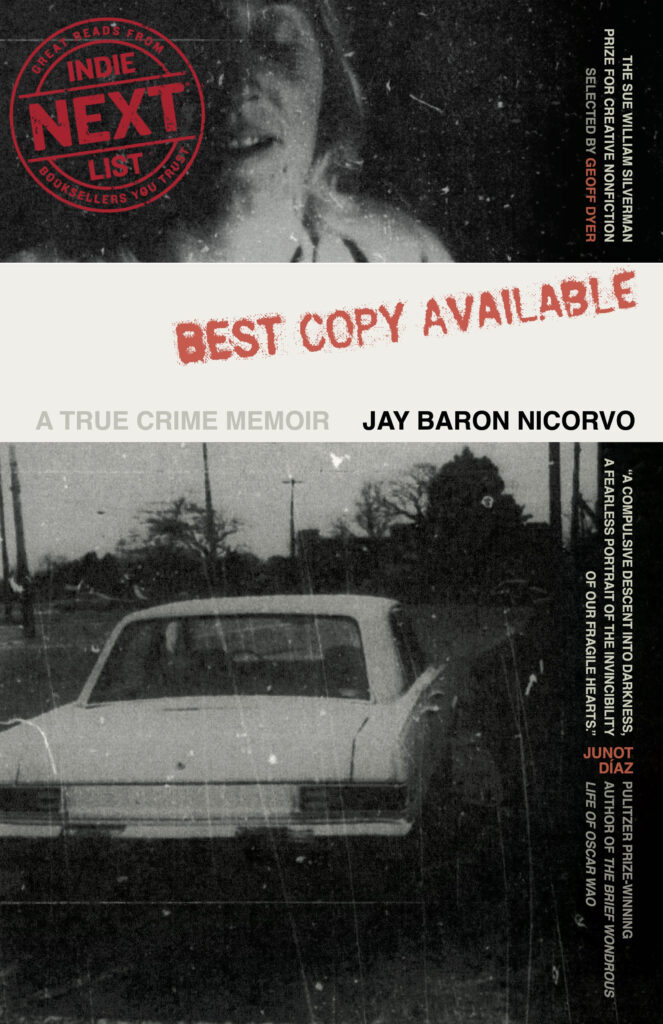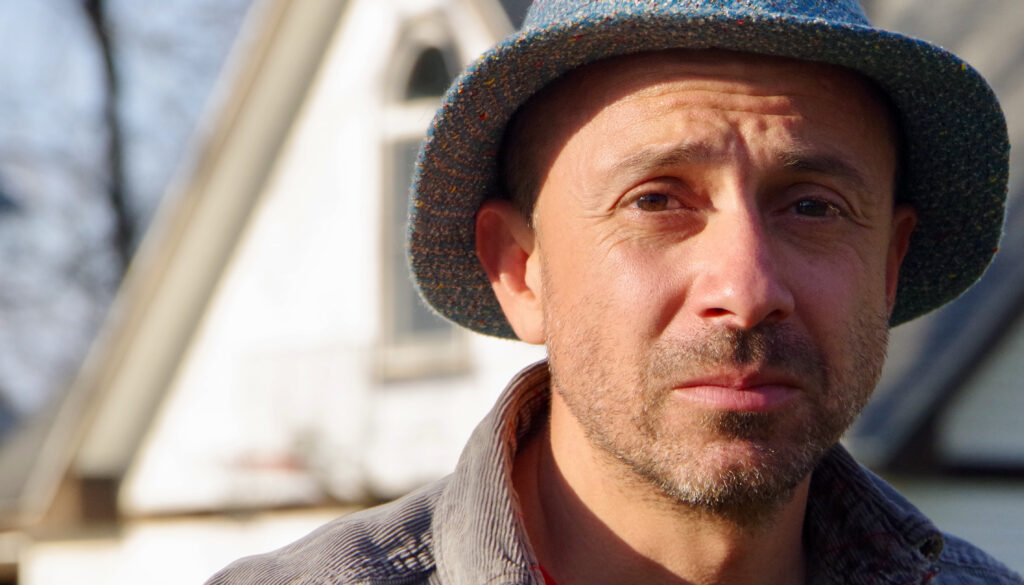
The University of Georgia Press, 2024. 240 pages ($28.95).
ISBN: 978-0-8203-6736-1
“Recalling involves overwriting. A memory is a copy of a copy. The more often we recall a real time and place, the further we get from the real.”
-Jay Baron Nicorvo, BEST COPY AVAILABLE
Reviewed by Latifa Ayad
The cover of Jay Baron Nicorvo’s BEST COPY AVAILABLE describes it as a True Crime Memoir. This categorization is only partially true. Yes, the crimes of the rape of Jay’s mother, Sharon, and the molestation of young Jay at the hands of a babysitter, are the black holes around which this story orbits. As Nicorvo writes, “Like the force of gravity, abuse bends space, torques time. The greater the abuse, the greater the gravity.”
However, the primary investigation of this memoir is no police procedural. It is not centered on the profiling and tracking of a criminal. BEST COPY AVAILABLE is as much about “true crime” as it is about the essential but impossible nature of truth. When Sharon is raped, she tells her young children that she was mugged, but seven-year-old Jay senses that something has been omitted. He “can’t help but feel, at the deepest level of awareness, a compulsion to know, if not alter, the distortion.” When the truth of the rape finally comes out, Nicorvo writes, “What lodges in me is the lie. By a shameful leap of kid logic, a lie looms greater than rape.” Jay’s emotions and understanding develop with age, but he continues to hold the truth as sacred, and, in his own household as a parent, the adult Jay is carefully honest with his son about the molestation he was subjected to as a child. For Jay, “Home is the place without secrets.”
Nicorvo meditates on how, even in the act of writing, he is recreating. “Writing focuses recall. Disciplines the mind. Trains it to see and hear things, things that aren’t actually there.” And, “Recalling involves overwriting. A memory is a copy of a copy. The more often we recall a real time and place, the further we get from the real.”
Yet the act of memory, recording, storytelling, is as essential to puzzling out the crimes portrayed in this book as it is to the act of “pulling down that wall—brick by brick, word by word—and rebuilding something, rebuilding this book, from the salvage.”
BEST COPY AVAILABLE is as formally flexible as the malleability of memory demands. The text makes use of interview transcripts, police reports, and photographs. Part II of the book switches, jarringly, to a second-person address, the object of address often morphing without warning from one male character to another. The unconventionality pays off as the reader begins to connect the “you” to a series of potential father figures for Jay, from his absent father Tony, his mother’s boyfriend Van, TV’s Roc Emerson, an oft-doubted God, and eventually Jay himself.
In the examination of truth, Nicorvo must reckon with all the difficult facts, including that Sharon, Nicorvo’s mother and a white woman, was raped by a black man. Sharon develops a fear of black men which the young Jay subconsciously picks up on, judging his mother as a racist until the truth about the rape comes out. A conflict between two watershed movements of the recent decade, #MeToo and #BlackLivesMatter, meet in a muddle with Sharon’s truth. Nicorvo does not solve this muddle, but he carefully contextualizes it. “Abuse is the serpent that eats its tale,” and Nicorvo is hesitant to completely lay blame. If anything, Nicorvo blames American systems of race, wealth, and masculinity. As we read, we come to the realization that this memoir is “true crime,” not as much in its examination of the rape of Sharon, nor of Jay’s molestation, but in its incisive investigation into the crime of being poor in America. Nicorvo highlights the bleak correlation between poverty and abuse. “The cause, poverty, and the effect, abuse, are so intimately united in this country that they’re nearly the same damn thing. Poverty is abuse.” BEST COPY AVAILABLE is an indictment of the structures that uphold the cycles of abuse as much as the men who perpetuate that cycle.
Intense and propulsive, the pages of BEST COPY AVAILABLE are binge-worthy and saturated with horrific beauty and nostalgia. Nicorvo writes settings which are rich and revolting: an oil blackened beach in Jersey, a cockroach infested kitchen in Sarasota, each place an artifact of poverty which is colored halfway-charming by the childhood joys of a Christmas dirtying fingers in the cold sand, by a Nintendo room where the hours are whiled away. Vulgar but not irreverent, there is much this story holds sacred. The strength and love of two women raising three boys. The brave act of telling the truth. In a world where father figures, “Dodge taxes. Ditch sons. Assault Mothers. Molest kids. Knife grandfathers,” Nicorvo questions, “This what it means to be a man in America?” But ultimately the book is hopeful and courageous, offering up the possibility to rewrite the survivor’s script.

JAY BARON NICORVO is the author of the novel The Standard Grand and a poetry collection, Deadbeat. His nonfiction has twice been named “notable” in Best American Essays. A proud community college graduate, he lives with his wife, Thisbe Nissen, their son, a couple of cats, a dog, and a dozen chickens on a defunct farm outside Battle Creek, Michigan. Find Jay at www.nicorvo.net.
LATIFA AYAD is a Libyan-American writer who was born and raised in Sarasota, Florida. She earned her MFA at Florida State and is currently seeking her PhD at Western Michigan University. Ayad is a MacDowell Fellow. Her novel-in-progress was a runner-up for the James Jones First Novel Fellowship. Ayad is the current editor-in-chief of Third Coast. For her complete published work, please visit latifaayad.com.
